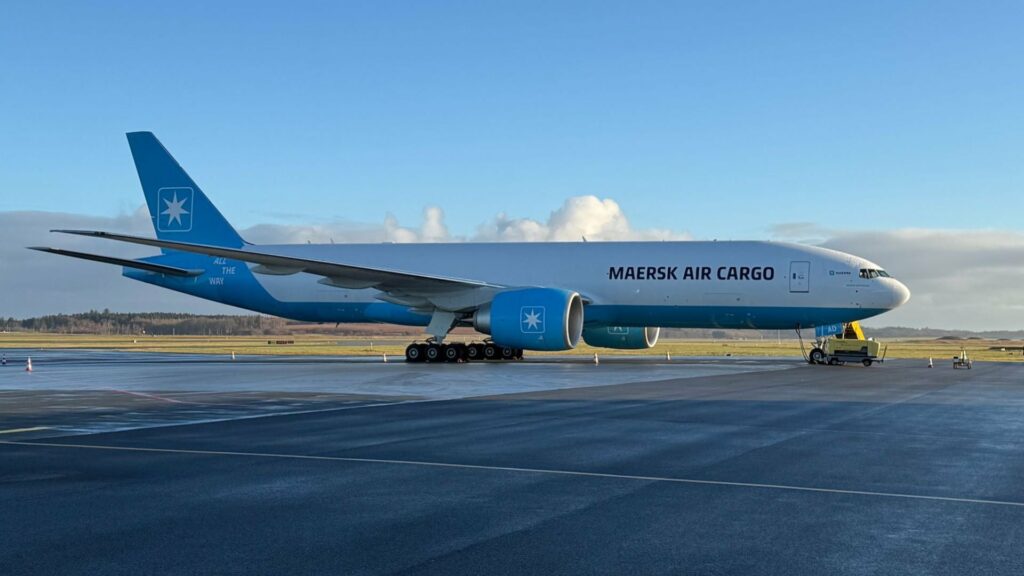Maersk Air Cargo, part of the Maersk ocean and logistics empire, will resume freighter service from China to its South Carolina hub at the start of the new year but will originate from a different city this time, FreightWaves has learned.
The all-cargo operator also plans to deploy its second Boeing 777 freighter aircraft by early 2025.
Maersk Air Cargo temporarily suspended scheduled flights from Shenyang, China, to Greenville-Spartanburg International Airport (GSP) via Seoul, South Korea, on June 1 so the Boeing 767-300 aircraft could be used to launch a route connecting Chicago-Rockford International Airport with Zhengzhou, China. Maersk said at the time it intended to restart its Asia-South Carolina service in August.
Maersk Air Cargo is making final preparations to relaunch service between China and GSP on Jan. 1, spokesman Rainer Horn said in response to an email query. The program will entail three flights per week, as was previously the case, utilizing a Boeing 767-300 cargo jet, but will connect GSP with Zhengzhou instead of Shenyang.
The company did not provide further details about what network adjustments are being made to accommodate the GSP deployment.
Maersk outsources flying of its 767 freighters operating from Asia to the United States to Miami-based Amerijet.
Meanwhile, a Boeing 747-400 freighter that Maersk Air Cargo charters from Magma Aviation, this month has begun flying a new route with a rotation of Liege, Belgium; Chicago-Rockford; Halifax, Canada; Liege. The Magma aircraft continues to operate regularly between Frankfurt, Germany, and Chicago-Rockford.
777 freighter
Meanwhile, Maersk in late November took possession from Boeing of its second 777 factory-built freighter and flew it from Seattle to its base in Billund, Denmark, according to a post on LinkedIn. Horn said the company is completing paperwork to get the new long-haul aircraft added to its operating certificate and will deploy it on a Hangzhou, China-Billund-Liege, Belgium, route in a few weeks.
The 53-day strike by Boeing machinists this fall likely delayed the 777 delivery, which was originally scheduled for the third quarter so it could be utilized for the peak shipping season.
Maersk has been operating its first 777 freighter since August multiple times per week between Billund and Liege, with alternating stops in Hangzhou and Ezhou, China, according to flight data site Flightradar24.
Management has previously said the large 777s offer better operating efficiency on China-Europe routes because of their ability to carry more goods than the 767, which is a medium widebody freighter. The Boeing 777F can fly up to 4,970 nautical miles and carry a maximum payload of 112.5 tons. The main deck fits pallets up to 9.8 feet high, and both cargo decks are temperature-controlled.
Maersk’s new freighter brings needed capacity to the Europe-China market, where main-deck freighters provide most of the airlift and have been operating most of the year at full capacity because of the surge of cross-border e-commerce shipments from Chinese online sellers.
In addition to the two production 777s, Maersk Air Cargo operates 20 B767 freighters – most of them post-passenger conversions. A portion of the fleet provides capacity for UPS in Europe. In 2022, Maersk made the strategic decision to expand its private airline beyond contract transport and utilize cargo jets to provide more transport options for its own ocean shipping and logistics customers. Maersk’s airfreight unit also charters aircraft from third-party providers like Magma Aviation.
Click here for more FreightWaves/American Shipper stories by Eric Kulisch.
Maersk Air Cargo receives first 777 freighter aircraft
Maersk launches Chicago Rockford-China air cargo service
‘No big bang’ for peak season air cargo business
Source link : http://www.bing.com/news/apiclick.aspx?ref=FexRss&aid=&tid=6759059f876b4cbf8be90e2f669c66c9&url=https%3A%2F%2Fwww.freightwaves.com%2Fnews%2Fmaersk-air-cargo-readjusts-china-north-america-network&c=11798894164508903871&mkt=en-us
Author :
Publish date : 2024-12-10 02:54:00
Copyright for syndicated content belongs to the linked Source.
